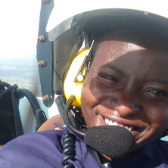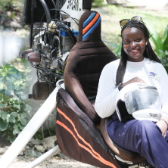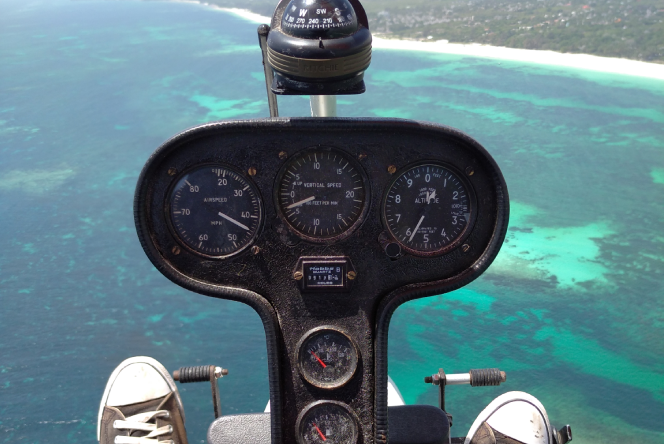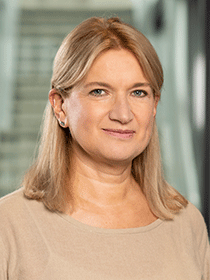Maseka Kithinji, MBA, knew early on that she wanted to become a pilot. During her pilot training, she realized that there was more to the aviation industry than being a pilot. That's why she took up MBA studies in Aviation Management in Krems, Austria. Today she is the first female weight shift microlight pilot in Kenya and founder of Girls in Aviation Africa, an NGO that helps girls to gain a foothold in the aviation industry.
How did your passion for flying get sparked?
When I completed my High School studies, I knew right away that flying is what I wanted to do for living. I was fortunate to be exposed to careers in aviation during my High School studies and the fascination of huge machines floating in the sky and not falling down not only sparked my interest but amazed me as well.

”
„My job entailed flying a sport aircraft known as a weight shift microlight at 1,500 feet above sea level spotting for whale sharks that migrate through the Kenyan Coast.“
Maseka Kithinji, MBA
Graduate - Professional MBA Aviation Management
What was the biggest obstacle for you to become a pilot?
The biggest obstacle then and now is funding for my flight training. The cost of becoming a pilot remains to be an expensive endeavor worldwide that unless sponsored through an airline or any other means the training period is prolonged.
You worked part-time as a conservation pilot for the East Africa Whale Shark Trust for two years. What exactly did you do there?
My job entailed flying a sport aircraft known as a weight shift microlight at 1,500 feet above sea level spotting for whale sharks that migrate through the Kenyan Coast between January to March every year. As a conservation pilot I did surveillance flights and once spotted, my co-pilot and I counted how many whale sharks there were and directed the boat in the ocean to where the animals were located for tagging and marine research purposes.
You are the first female weight shift microlight pilot in Kenya. What is special about this aircraft?
In this part of the world, it is an interesting aircraft that is not common to Kenyan skies. It is an open cockpit, a two-seater with a fuel endurance of 3 hours, we actually sit on the fuel tank as pilot and co-pilot. The wing is a cloth wing and is the shape of a kite. Not many people think it can fly but it never fails to defy gravity and take me up to the sky and back down.
„I wanted to know more and understand better how the aviation industry works and functions through the different systems at play.“
Maseka Kithinji, MBA
Graduate - Professional MBA Aviation Management
You first completed a law degree and then your MBA Aviation Management. What were your reasons for doing the MBA?
When I completed my High School studies my family did not have funds readily available for me to pursue my dream to become a pilot, so I had to settle for a degree instead. Throughout my undergraduate studies in law, I never lost sight of the desire to join the aviation industry. When the opportunity presented itself to join a flight school, I jumped at it. However, during my pilot training I discovered that there is so much more than being just a pilot in this industry. I wanted to know more and understand better how the aviation industry works and functions through the different systems at play. Not only from a pilot’s perspective but a manager as well.
Why did you decide for the MBA Aviation Management program at the University of Continuing Education Krems, Austria?
I was fortunate to meet my Professor, Prof. Doc. Wolf Muller at an aviation law conference that was held in Nairobi in 2019. I networked with him and expressed my interest in understanding the aviation industry better and he shared with me about the program in Krems. I was immediately excited and purposed to study my MBA in aviation management at the University of Continuing Education Krems (Danube University).
What did you like about it in particular?
I enjoyed meeting and networking with different people from different parts of the world in the aviation industry. It was quite insightful to learn how they manage their systems and what I can learn from them all.
What was the hardest part of the MBA program for you?
I had to relocate from home (Kenya) to Austria for short periods. That was challenging. As well as certain units that challenged my scope of thinking beyond what I am used to. But overall, I enjoyed the program, and it definitely has broadened my horizon and given me a deeper understanding and appreciation for the aviation industry from the airline and airport perspective.

”
„Girls in Aviation Africa not only exposes young girls to careers in aviation but mentors them through the start of their careers.“
Maseka Kithinji, MBA
Graduate - Professional MBA Aviation Management
You are the founder of 'Girls in Aviation Africa', a non-profit organization that encourages and supports young girls in Africa to pursue careers in the aviation industry. Why did you start this organization?
When I started my career in aviation, I had no direct support or mentors to walk with. It was difficult navigating which flight school to go to and even during my training a support system within the industry would have helped me a lot to learn all these new concepts. This serves as part of the barriers that I believe exist and hinder young girls from pursuing careers in aviation. I wanted to and still do desire to change that narrative. As a pilot and now an MBA aviation graduate, I am able to have a holistic picture of what the aviation industry entails and share it with as many young girls interested in careers in aviation. My foundation is also made up of a network of young girls who have started their careers, we encourage one another, share job opportunities and assist in studies for examinations. In creating this sisterhood network, we are creating the support that many of us did not have when we joined the industry trying to navigate it all. So, our main goals are exposing young girls to careers in aviation and creating a sisterhood network of support.
How does Girls in Aviation Africa support the girls?
Girls in Aviation Africa not only exposes young girls to careers in aviation but mentors them through the start of their careers. We share scholarship and sponsorship opportunities that we come across and assist one another with applying for the same. As earlier mentioned, it is a network, so we share whatever job opportunities that come by with one another.
„I enjoyed the program, and it definitely has broadened my horizon and given me a deeper understanding and appreciation for the aviation industry.“
Maseka Kithinji, MBA
Graduate - Professional MBA Aviation Management
Program
Tags






